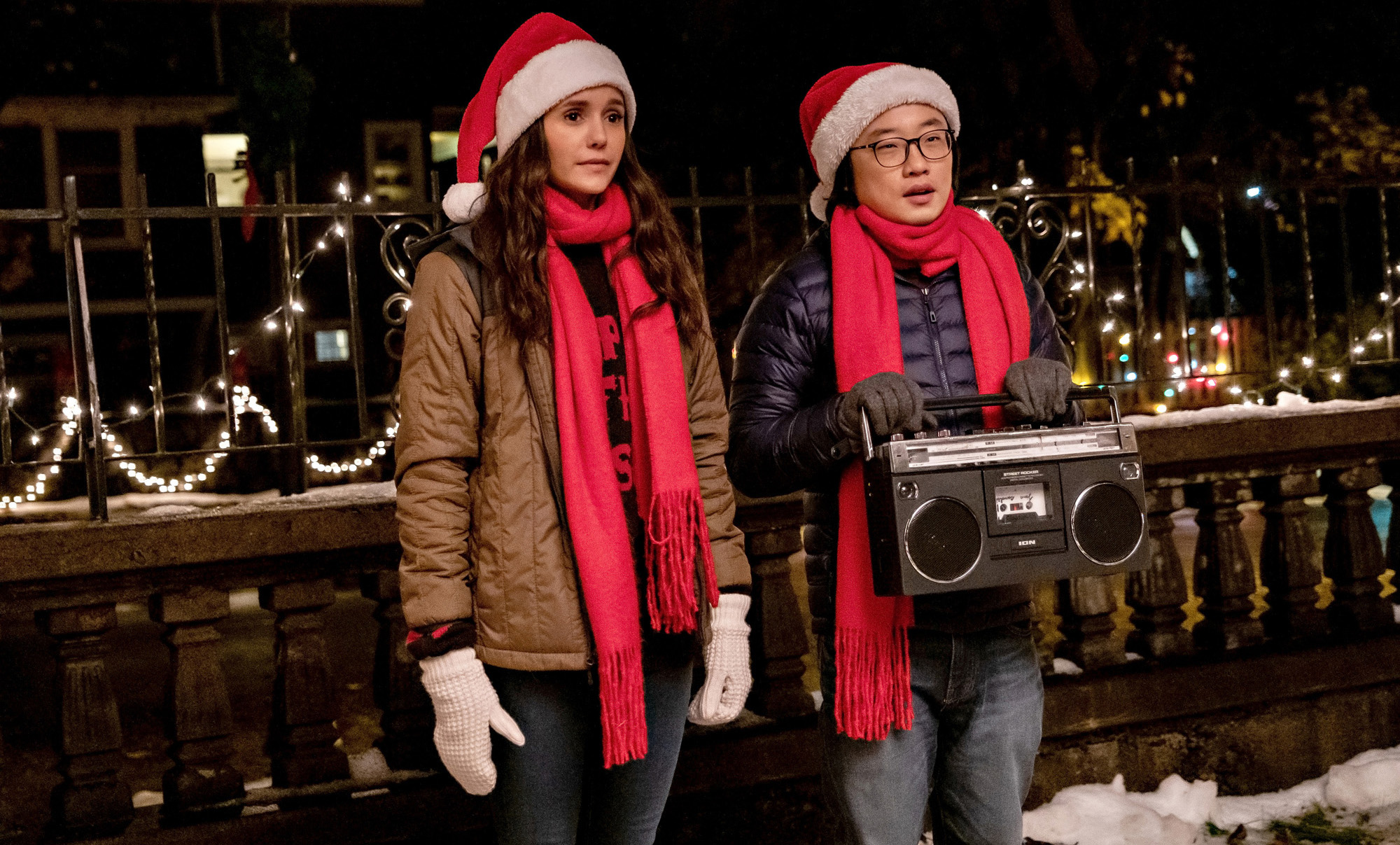When it comes to Christmas romantic comedies, I am a serial right swiper—even if the acting isn’t stellar or the script is hilariously cringey. So, I was excited for the annual rollout on Netflix. But when I watched the trailer of Netflix’s newest Christmas movie, Love Hard, I knew I would have some qualms about it.
Finding love is hard in the age of online dating. It’s a truth many singles know, especially the movie’s protagonist Natalie Bauer (Nina Dobrev), an L.A. writer who chronicles her dating disasters for an online magazine. Natalie hasn’t had any luck meeting a decent guy, despite being an active swiper and going on dates with her matches.
One evening, she comes across a profile she’s too intrigued to swipe left on: 30-year-old Josh Lin (Jimmy O. Yang) who lives on the east coast. But Josh’s profile is fake, and his pictures are not of himself, as we later find out. They’re pictures of Tag (Darren Barnet), who is a conventionally attractive guy that the real Josh is using to catfish.

I didn’t find the catfish trope to be appealing compared to the common ‘big city girl returns to her small hometown and falls in love with an ex.’ Perhaps this is because in real life, catfishing at its best can be a betrayal, but at its worst can be dangerous for women, young people, and marginalized people.
After sharing a few messages and cute banter, Natalie is sold on Josh. And like most single girls, Natalie tells her colleague about Josh and shows her his (fake) profile. This is where the movie lost me. Upon looking at his face, Natalie’s colleague points out that he’s Asian American as if Natalie had found a gem, or even something exotic. It’s a jarring detail because the comment sets the underlying tone of the movie: there are Asian American men who are desirable to white women, and there are Asian American men who are not.

On one hand, I understand that pointing out this racial detail might have helped viewers realize Tag and by extension, actor Darren Barnet is of Asian descent. But on the other hand, it felt like a diversity cop out to highlight that attractive white women are in fact attracted to Asian men. And this is the implication that carries throughout the film.
When Natalie flies out to surprise Josh for the holidays, she learns she’s been catfished. She meets the real Josh, a funny Chinese man who isn’t Hollywood’s definition of attractive—unlike Henry Golding or Simu Liu. After explaining that Josh hadn’t meant for their dating app connection to be anything serious, or that he thought Natalie would fly out to meet a stranger across the country, the two devise a plan for Natalie to meet the real Tag.
For all the conversations about diversity and better representation, this Christmas movie leans into the harmful stereotypes Western societies have about East Asian men, and Asian men in general: the weird, nerdy, and desperate non-white man on the internet who virtually connects with pretty white women.
As a woman, it’s always a bit unnerving when a stranger slides into your DMs. But this creepy Asian man trope is so ingrained in the minds of the West that it’s become a TikTok trend. Attractive white women will use a snippet of Taylor Swift’s “You Belong With Me” in their videos to highlight that for every attractive man who is disinterested in them, an Asian man—often South Asian man—is in their DMs, expressing romantic interest.
It’s worth noting, as Jimmy O. Yang mentions in an interview with Pop Sugar, that Josh “wasn’t written to be a particular ethnicity.” And yet, Josh and his family as concepts embody the white Christmas experience, over the top holiday lights, carolling. This is why having a writer who has a nuanced understanding of race in popular media is integral to better representation for non-white actors. I didn’t even need to confirm whether the writers, Daniel Mackey and Rebecca Ewing, were white because the writing spoke for itself. Whether Josh was written for an Asian man or not is irrelevant because he was still played by one. This means the lived realities of being an Asian man in the West become part of that role too: the desexualization of Asian men.
In the end, Natalie realizes that even though she finds Tag physically attractive, she doesn’t have an emotional connection with him—in the way she does with Josh. So, ignoring the superficial expectations of wanting a physically attractive man, Natalie embraces her feelings for Josh just in time for Christmas.

To the naive viewer, this might be a cute Christmas rom-com ending. But to the Asian viewer who is familiar with the way white society views Asian men, Natalie’s romantic realization highlights a message many know too well: Asian men have a chance at love only when they’ve had the opportunity to show off their personalities.
Even though this holiday movie includes a diverse love story and cheeky comedy, it still participates in perpetuating harmful stereotypes of Asian men. So, as I predicted after watching the trailer, Love Hard was a swipe left for me.
Carol Eugene Park is a freelance journalist and writer based in Vancouver, B.C., with interests in arts and culture, and audio storytelling. She has previously written for Global News, Globe and Mail, CBC, Chatelaine, and more. When she’s not working, she’s either listening to a podcast about human connection, or rewatching This Is Us.
P.O.V. is a place where the Asian community can voice their views and perspectives on topics that matter most to them. Interested in contributing? Email us at info@representasianproject.com.
Like this post? Follow The RepresentASIAN Project on Instagram, TikTok and YouTube to keep updated on the latest content.









